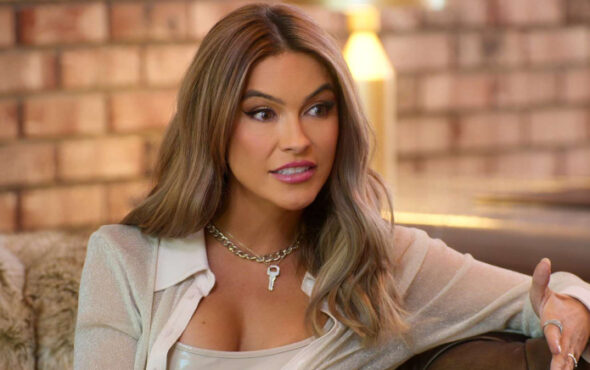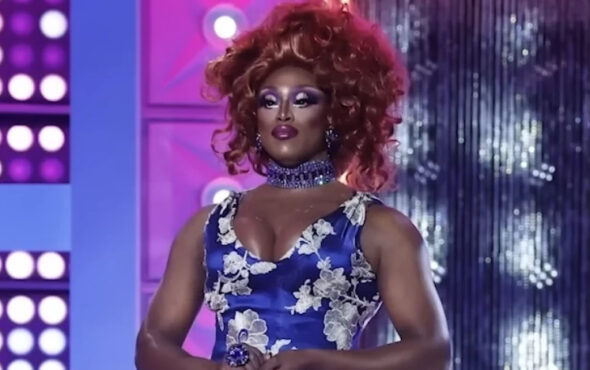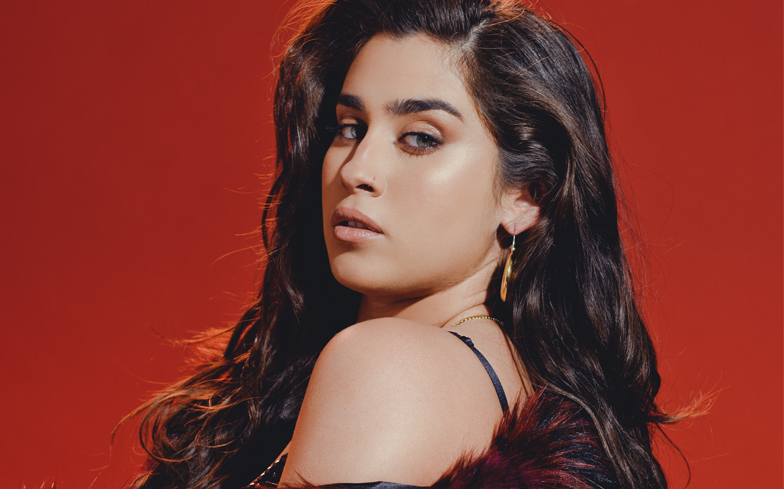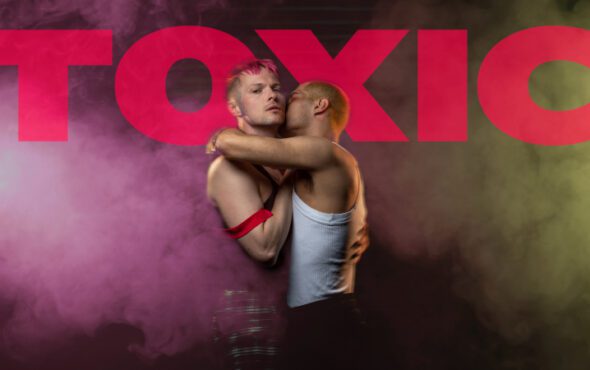
We’re big fans of Nathaniel Hall here – he was, of course, star of our screens in Russell T Davies’ hit show It’s A Sin, playing the role of boyfriend Donald opposite Olly Alexander’s Richie. We interviewed Nathaniel later in 2021 following the success of that TV show and ahead of the tour of his own play First Time, which we reviewed last year. Later this month, Nathaniel will return with his new play, Toxic, which is being produced by Dibby Theatre and is scheduled to open at Home Manchester on Wednesday 18th October.
When we meet Nathaniel, on an uncharacteristically sunny September afternoon, he’s dyed his hair dramatically, shockingly pink. Is this for the new play? “I was just bored!” he laughs. “Do you know what it was? Obviously it’s lovely and sunny right now, it’s beautiful, but July and August were not the best. It was, like, the 70th day of rain and I thought I had to do something, I need some sunshine in my life! This is everyone’s favourite colour, highlighter pink… I did it just for fun, but I kinda enjoy it.”
Before discussing the show we have a chat about the theatre, Home Manchester, which is a relatively new venue in the city and it has already started to develop a reputation as an important space championing new LGBTQ+ works. Not only is it offering a platform to locally-sourced talent, it’s also a venue for queer touring shows – this summer it’s played host to Cruise, which we caught on the West End last summer and adored. While we’ve yet to catch a show at Home Manchester, in a coincidental turn of events, our previous interview with Nathaniel was conducted in the theatre bar there.
Anyway, enough about the venue – we’re here to talk about Toxic. So what’s it all about? “Toxic is ‘not another play about gay shame’ – except it absolutely is. We meet two characters, one’s the playwright, which is me, the other is the performer, played by Josh-Susan Enright. It’s the story of how two people met, fell in love and fucked it up, and I think it’s quite a recognisable story for lots of people, not just queer people. Both of them have troubled pasts, trauma in their pasts, I mean they’ve grown up queer for a start! Most of us have some bad experiences from school or with family, those things can have a profound impact on us.”
“They meet and they’re at this stage where they’re both ready to settle, they’ve both been through the mill on the queer dating scene, been on the apps, been to the parties, they’re both ready to settle down. Except the playwright has just found out… it’s 2016 and he’s just found out that U=U. So they’ve just found out that they’re no longer a danger to people in terms of sex, in terms of HIV transmission, so what that does is it unlocks something and they are, all of a sudden, ready to explore a Pandora’s box of sexual delights.”
“The performer has just moved back from London to escape,” Nathaniel continues. “The performer had fallen into quite a dark place in terms of chemsex and that scene, so they’re ready to run away from all that stuff. They meet at this point and collide, and it’s this recipe for disaster in terms of their relationship. What this show tries to do is show that our past experiences, our past trauma, can be present in the present moment and if we don’t speak openly then communication breaks down in a relationship, that’s where things get misunderstood, that’s where relationships ultimately fail. It’s a compassionate look at all that.”
Nathaniel’s previous play, First Time, was quite autobiographical – we were wondering whether the same was true of Toxic? “It’s semi-autobiographical. When I was making First Time, my professional life was skyrocketing, success at the Edinburgh Fringe, I got the job on It’s A Sin in 2019, just after I’d made the show. There was this incredible upwards trajectory in my career, but my personal life was taking a real nosedive. I’d always struggled in relationships and had been in a relationship at that point for five years, which was very toxic, very co-dependent, at times it was abusive.”
“There was a realisation at that point that I needed to escape,” Nathaniel continues. “I’d tried to leave that relationship a number of times but for various reasons… you are kinda locked in this cycle of co-dependency, which is what Toxic explores. So Toxic is not an autobiographical portrayal of that relationship, but a lot of the experiences that I had gone through are in there.”
In researching the show, Nathaniel looked at some of the statistics around queer relationships. “One in four gay – and one in three bisexual – people will suffer domestic abuse, after the age of 16. That really shocked me, that’s a quarter of us! And more for bisexual people. We know all the other stuff, stats around LGBTQ+ life, higher rates of depression, higher rates of anxiety, people with HIV still facing stigma from friends and family and in the workplace, global majority people facing racism from within our own community, high rates of illegal substance use – we know all that.”
“I was like – there’s something going on here. Being gay’s great and I think queer people are magical, and wonderful – we are! But there’s the glittery, kinda forced-positivity movement at Pride, perhaps this is disguising some of the struggles that people have, behind closed doors.”
“I started to talk to people and the more people I spoke to, the more people were going ‘yeah I’ve been through that’ – I think everyone can relate to being in relationships where they don’t feel that their partner respects them, or where boundaries are crossed, or not knowing how to communicate boundaries.”
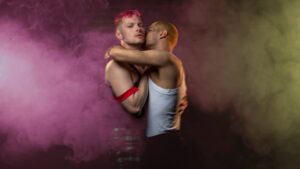
We then discussed LGBTQ+ education – we’d both been at school around the same time, under Section 28, so we had both received very little LGBTQ+ education growing up. “No one has taught us as queer people how to say no, or state what our needs are or express our feelings… our generation had little-to-no sex education. Our education was jumping onto the gay scene – and as much as I love the gay scene, we’re probably not learning from the best role models! Because we’re learning from people who also had no conversations about consent, or how to deal with internalised shame or homophobia, or how to heal from trauma.”
“It’s actually in Toxic, the back story of the playwright is also linked to my story,” says Nathaniel. “I had a lesson in Year 10 on HIV and AIDS. It was in PHSE, so it was a maths teacher or something… they wheeled out a video player, put a video on – bearing in mind that although I wasn’t out at school I was bullied, people saying that I was gay or effeminate. I sat in the class and watched a video, and it had a man in his mid-20s and he had an AIDS diagnosis and he was dying. So it was out of date by this point, this was early 2000s so medication would have been around.”
“I sat there and that was my first experience of seeing a man talk about being gay on-screen. My first experience should have been transformative, like ‘oh my god there’s someone like me on there!’ Instead it was just like ‘don’t be gay, you’ll get AIDS and die’ which was like Coach Carr from Mean Girls only much less funny. I remember sitting there and feeling all the eyes – maybe it was just my perception – but it felt like 27 pairs of eyes burning into the back of my neck, and trying not to flinch, trying not show any indication that I was even bothered by this film or that it piqued my interest in any way.”
“Internalising all that stuff, pushing it down and showing the world that I wasn’t that thing, I wasn’t gay, suppressing who I was… then a couple of years later, at 16, when the prophecy came true, you can see very clearly how that had a profound impact. I shut down, I didn’t want to talk about that, because I felt as though actually – I had been warned? Obviously it wasn’t the best warning, or the best way to talk about it.” Nathaniel was diagnosed HIV+ at age 16, following his first sexual experience – this is documented in his previous play, First Time.
Toxic is quite a different show to First Time, not least because there’s a much bigger team involved – how has that process been? “It’s really pushed and challenged me. My background is more in live art and performance art, so it’s been great to learn a new skill, I’ve worked with some amazing dramaturges – and also with just the most amazing team who are offering feedback all the time. The couple in the play is an interracial couple, my character is, obviously, white – and the other character is dual heritage, Caribbean and white British. That has an impact – colourism and racism is explored in the play.”
“We did an amazing sharing of it with interracial couples, we invited queer interracial couples to come and listen to a read through and offer their feedback and it was so beautiful. It opened up some really interesting dialogues between couples who potentially might not have even spoken about these things, these unwritten power structures that exist within our culture and society around race and cultural heritage.”
“It’s been two years since you and I first spoke about Toxic, I’ve worked this play over and over, in different formats, trying things out and I’m grateful for all of those people that have helped, commented on, given feedback – and being really honest! Sometimes there’s been really brutal feedback… as a white writer, if I’m writing these characters, I have to listen. I’ve got lots of friends who are global majority, who are black British, or Asian British, or from the Middle East – they often say to me, ‘we can’t do all the heavy lifting around racism and smashing white supremacy’ and I get it.”
“I can’t do all the heavy lifting around HIV either, we always talk about allies. I think this is something I was scared of in the early stages, getting it wrong. If your heart’s in the right place and someone tells you you’ve got it wrong, and you’re gracious enough to go ‘ok I’ve got it wrong, how can I learn?’ – that’s alright! No-one’s going to turn around and hate you because you were trying. I think the fear of saying the wrong thing sometimes stops people from stepping in, so I think it’s really important to acknowledge where you’re able to start a conversation or ask a question.”
Unusually for a play, Toxic has an original soundtrack – we’re interested to know more about that, and how it came about. “The show itself is set in the world of the underground queer rave culture that’s here in Manchester. It’s where the characters meet, it’s the world that they live in, this hard and fast partying lifestyle. With that in mind, I wanted to recreate that feeling on-stage, and I was really interested in gig theatre, there’s lots of amazing theatre that’s not musical theatre, but that uses music as its starting point – like Cruise, for instance.”
“I just thought, is it possible to use House music to soundtrack something? Does that work? I’ve not really experienced much of that within theatre, and I think House music, electronic music, can be as emotionally stimulating and moving and expansive as any other genre of music so I was really excited to see what we could do in terms of how you make an audience feel through music. In terms of the target audience of this show, it’s people who like to go out and have a good dance, so it’s the music of their culture, their lifestyle.”
It all sounds promising and we’ll be intrigued to see the show when we have an opportunity. One final question – why should GAY TIMES readers come along and see Toxic? “I think lots of queer people will recognise their own experiences within the show, where they’ve been through the exact same experiences as these characters. I want people to come along and I want them to see their lives represented back in all their beauty and chaos and wonderfulness and queerness thrown back at them, I want people to laugh along with us, I want people to cry.”
“I want people to maybe look back at their own wounded queer child – because we’ve all got one, we’ve all been through some stuff – and together collectively in that space say ‘we survive’. It’s going to be ok! Also if you’re someone who’s going through something difficult, like a HIV+ diagnosis, or you’re stuck in an abusive or a codependent relationship, or you’re really struggling with substance use, you can get through it with the right help. I hope the show gives people that hope, and shows that although our community sometimes does have some flaws, we’re a really beautiful and supportive community as well.”
“I wanted to mention, around the framing of the show, it’s not saying LGBTQ+ people are inherently bad or broken in any way. What it’s trying to do is look at the society and the power structures that we live under, we live in a profoundly homophobic and transphobic society, a society full of toxic gender norms and stereotypes, a racist society. It’s not about beating us up, it’s actually about going and giving ourselves a bit of a break, and saying – considering all that – we’re doing alright!”
Toxic plays at Home Manchester 18-28 October 2023. More information can be found here.

